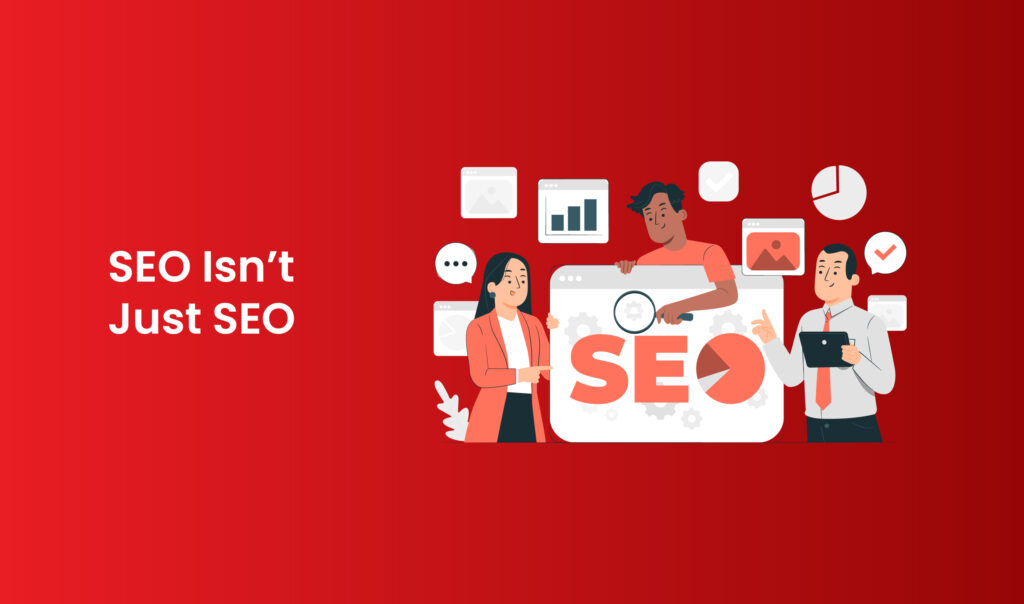Learn all about the essential components of successful digital marketing by delving into this comprehensive guide on SEO.
It’s fantastic to invest in internal Search Engine Optimization resources, whether it’s through consultants, software, or agencies, especially when you have clear organic search objectives in mind.
However, what’s not so great is realizing later on that your initial investment didn’t cover everything you needed. Nobody enjoys unexpected expenses, additional budget requests, or having to backtrack to ask for more resources than originally anticipated.
Whether you’re overseeing SEO internally or responsible for digital marketing performance overall, it’s crucial to grasp the full scope of what’s required for success. Your marketing strategy should encompass all the necessary resources to achieve your objectives.
Remember, Search Engine Optimization isn’t a standalone endeavor; it’s intertwined with various disciplines and involves multiple decision-makers. Collaboration and comprehensive planning are key to effective SEO implementation.
In this article, I’ll outline 10 crucial considerations to prevent unexpected change orders or additional expenses as you work towards your SEO objectives.

1. Executive & Management Support
Before diving into the intricacies of SEO, it’s vital to ensure that your management team comprehensively understands and backs your SEO efforts. They need to grasp that SEO involves more than just the technical aspect and should be aware of the associated complexities and expenses necessary for success. This includes setting realistic goals, managing expectations, and allocating resources appropriately. While they don’t need to be website optimization experts themselves, their awareness and support for the comprehensive needs of Search Engine Optimization are essential.
2. Developed Products Or Services
Effective Search Engine Optimization requires significant investments in time, technology, and expertise. It becomes challenging when there are gaps in product development, insufficient sales demonstration, or a lack of strategic clarity in branding. Without these foundational elements, achieving SEO goals becomes a moving target, leading to wasted efforts and resources. The website optimization process, coupled with content creation, demands substantial effort. Therefore, it’s crucial to avoid focusing on irrelevant topics or content that lacks relevance to your target audience. Constantly changing targeting and goals can be costly and inefficient, akin to starting over repeatedly.
3. Legal & Compliance
Acknowledging the necessity of legal reviews, adherence to guidelines, and compliance standards within industries and companies is crucial. Ensuring every aspect is executed correctly holds significant importance.
However, SEO professionals may sometimes overlook this aspect. From understanding permissible content for publication on the site to navigating lead times and the complete process for content and web updates, legal and compliance considerations extend beyond the realm of Search Engine Optimization but profoundly impact it.
Industries like healthcare, financial services, among others, typically undergo rigorous legal and compliance procedures, which must be integrated into SEO plans, encompassing factors such as timing and associated costs.
4. Content
While some search engine marketing experts possess exceptional copywriting skills, in smaller companies, individuals often juggle multiple roles. It’s common for the same person to handle SEO strategy, tactical implementation, and content creation aligned with the SEO strategy.
However, crafting compelling content involves an art and science that may exceed the skill set required for website optimization tasks alone. Bringing in individuals without explicit SEO titles becomes necessary for executing the plan and ensuring content success across the entire customer journey and objectives.

Understanding the role of content and investing in it beyond the confines of website optimization roles are pivotal. Whether through an in-house writer or an external resource, recognizing the significance of content is paramount, considering its substantial impact on SEO.
5. UX
An SEO professional’s role doesn’t end when a user clicks from a search engine to your website. That’s often just the beginning of the journey. Now, the user is on your site, navigating through your funnel or customer journey towards conversion and your ultimate goals.
Some SEO professionals or agencies only focus on reporting website optimization metrics, leaving clients to piece together the rest on their own. This creates a gap between SEO, user experience (UX), and web development.
Without someone considering or implementing conversion rate optimization (CRO) testing on the website, there’s a significant disconnect between teams. While we all want a visually appealing, accessible, and engaging site, integrating content, page experience, and conversion flow requires collaboration. SEO professionals typically don’t control site design, page layouts, or aesthetics—and they shouldn’t.
6. Dev & IT
Closely tied to UX is the need for individuals in development (Dev) and IT roles. While some technical SEO experts understand backend site operations and server configurations, most companies have dedicated in-house or contracted roles for these tasks.

Even if you have a fantastic website with all the content management system (CMS) controls you need for on-page optimization, there’s often still a need for development work. Implementing changes like content architecture adjustments, URL structure modifications, redirects, or optimizing page experience can be significant hurdles without the necessary resources or budget allocation.
7. Sales
While sales teams aren’t typically the ones leading Search Engine Optimization strategy and tactics, the gap between sales and marketing teams still exists in many companies. It’s beneficial to bridge this gap by involving salespeople in your SEO efforts. Aligning goals is a starting point, but gathering insights from sales on which content resonates with prospects and understanding how SEO conversions contribute to successful deals is invaluable for shaping your strategy and optimization plan.
8. Your Clients/Customers
Just as sales can provide valuable data downstream, it’s essential to engage with your clients also or customers directly.
Even if your customer relationship management (CRM) system tracks every interaction, gathering their perspective adds significant value.
In an era where data privacy concerns are growing, closing this feedback loop becomes even more crucial. Click here for read more about the Best Way to Get Client Buy-In for SEO
Establishing a plan, communication channels, and incentives to collect feedback from customers helps refine targeting, strategy, and better utilize content and website teams.
9. Tech Stack
Technology plays a crucial role in powering SEO efforts. Reflecting on my early days in SEO almost two decades ago, it’s remarkable how many manual tasks I used to perform that are now automated by tools and technology within minutes.
From research tools to reporting platforms and innovative AI tools, each component of your tech stack comes with its associated costs.
While I’m addressing those outside the realm of SEO, it’s essential to highlight the importance of investing in the right tools to maximize SEO effectiveness. Ensure that decision-makers understand the necessity of allocating additional funds specifically for your tech stack, alongside other resources required from various functions.
10. Your Own Skills/Team Investment
Just as investing in your tech stack is crucial, investing in yourself and your team is equally essential for SEO success.
The pace of SEO evolution is rapid, if not accelerating. Being the sole individual or one of the few in your organization who comprehends website optimization leaves you isolated.
Consider utilizing personal development funds to join professional networks, attend industry conferences, receive expert training, or enhance skills as needed.
Go From Beginner to Expert in
Just 8 Months!
With Purdue PG Digital Marketing Program
Conclusion
SEO involves numerous individuals who don’t bear titles explicitly related to SEO. As an in-house individual responsible for website optimization, you rely on various functions and resources, including people and, often, financial resources, to achieve your goals.
Consider the eight specific functions outlined above, along with the last two areas of investment, to ensure you’re prepared for the genuine costs of SEO. Whether you participate in budgeting processes, manage the budget, or have expectations regarding earch engine marketing performance, having a comprehensive understanding from the project’s outset is crucial.
Understand all components, calculate the full cost, comprehend your ROI equation, and execute a well-organized plan to attain your objectives!

